When Andre Audette first arrived at Notre Dame for grad school, he got a brochure about living in South Bend, Indiana.
That brochure included a section on churches and advice on which Catholic parish to attend if you were conservative and which to attend if you were liberal.
While Audette ignored the brochure’s advice — choosing a different parish altogether — the link between church shopping and politics stuck with him.
“I found that kind of fascinating,” said Audette, now an assistant professor of political science at Monmouth College in Central Illinois.
Audette is co-author of a new study on the role politics plays in finding a church, published in “Politics and Religion,” a journal of the American Political Science Association. The study — based on a survey of 2,000 Americans — found about half of those surveyed said they had gone shopping for a new church. The survey also found about 1 in 10 Americans (11.1%) said they’d left a church for political reasons, with another 7% saying they’d “seriously considered” leaving their church over politics.
Your tax-deductible gift helps our journalists report the truth and hold Christian leaders and organizations accountable. Give a gift of $30 or more to The Roys Report this month, and you will receive a copy of “Hurt and Healed by the Church” by Ryan George. To donate, click here.
Evangelical Christians (81%) were most likely to have shopped for a new church.
Mainline Protestants (30%) and atheists (32%) were most likely to say they’d left a church or thought about leaving over politics. Atheists (16%) were least likely to have shopped for a new church, while Black Protestants (13%) were least likely to have left a church due to politics.
When it comes to politics, Mainline Protestant churches are in a difficult spot, because they are more politically diverse than either evangelical churches or Black Protestant churches. In the 2020 election, 91% of Black Protestant voters supported Democratic candidate Joe Biden, while 84% of white evangelical voters voted for Republican candidate Donald Trump, according to analysis by Pew Research.
Mainline Protestants, which Pew described as “white, non-evangelical” Christians, were split — with 43% voting for Biden, 57% for Trump.
When they are shopping for a new church, evangelicals go looking for another conservative evangelical church like the one they left, where most people vote Republican, said Audette.
“Democrats are mostly just leaving the more liberal denominations,” he said. “It’s a hard time to be a mainline Protestant right now.”
The study in “Religion and Politics” was based on survey data collected in 2017. Audette suspects that political polarization has gotten worse since then, especially due to the COVID-19 pandemic, which likely intensified the role politics plays in congregations.
Audette, who is Catholic, said he’s seen polarization affect both Catholic parishes and Protestant churches, turning congregations into the same kind of echo chambers that can be found in other parts of American culture.
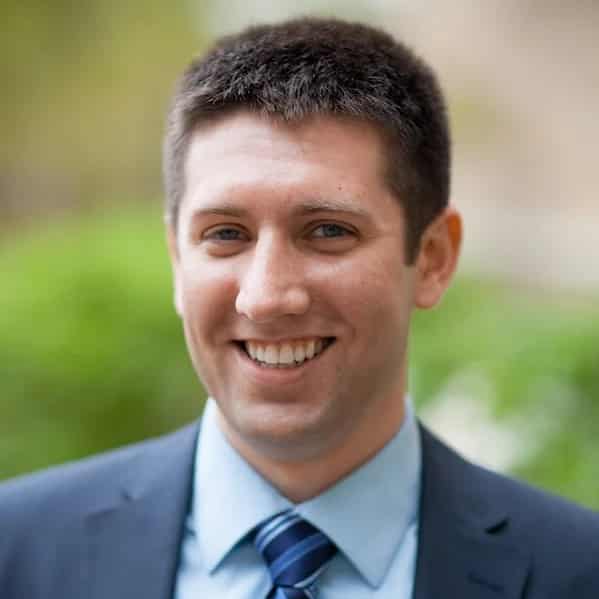
“We are starting to see churches that are really formulating their identity around these political ideals,” he said. “That’s really harmful, because it used to be the case that when you’d go to church, you’d sit next to someone who’s a Republican, someone who’s Democrat, and you’d get a little bit of cross-cutting discussion going,” he said. “That’s not happening anymore.”
Scholars such as Ruth Braunstein at the University of Connecticut have argued that the rise of partisan politics, especially by the religious right, has helped fuel the decline of organized religion and the rise of the nones — Americans who claim no religious identity. About 3 in 10 Americans now would be considered nones, according to Pew Research. In the book “Secular Surge,” which looks at the nation’s growing secular population, the authors argue that conservative politics has made some Americans “allergic to religion.”
A recent survey from Lifeway Research, an evangelical research group, found that half of Protestant churchgoers agreed with the statement, “I prefer to attend a church where people share my political beliefs.” That same survey found that 55% of Protestant churchgoers said people in their congregation shared their political beliefs, while only 23% said people in their church held different beliefs.
Pew Research found in 2016 that about half (49%) of Americans have looked for a new congregation at some point in their life. The most common reason was that they moved (34%), got married or divorced (11%) or disagreed with clergy (11%). That study found that the quality of sermons (83%), a warm welcome (79%), the style of worship (74%) and location (70%) had the most impact when choosing a new house of worship.
Audette, who co-authored the study with Shay R. Hafner, one of his students at Monmouth, has argued in the past that politics may be good for some churches, driving up attendance, but can be bad for religion. In a 2016 article, based on a previous study, he and co-author Christopher Weaver compared the mix of religion and politics to American fast food — which tastes good but is not good for you.
“Although the overall number of fast food consumers continues to shrink, the most successful chains can gain more of the remaining consumers by doubling down on the very practices that are shrinking the market,” they wrote. “Similarly, a church’s political activities may do little to change the public image of religion in the U.S., but they do make the church more appealing to those who still attend church.”
The appeal of politics to churchgoers puts pastors in a difficult spot, he said, something he hopes to study in the future. The very things that may help their church grow could turn away those outside the church.
“Do you double down on the people that are interested in conservative religion and politics and just try to appeal to them?” he said. “Or do you try to open it up, engage some topics that might be uncomfortable for people? That’s a really hard decision to make.”
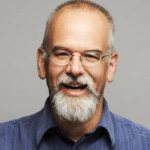 Bob Smietana is a national reporter for Religion News Service.
Bob Smietana is a national reporter for Religion News Service.




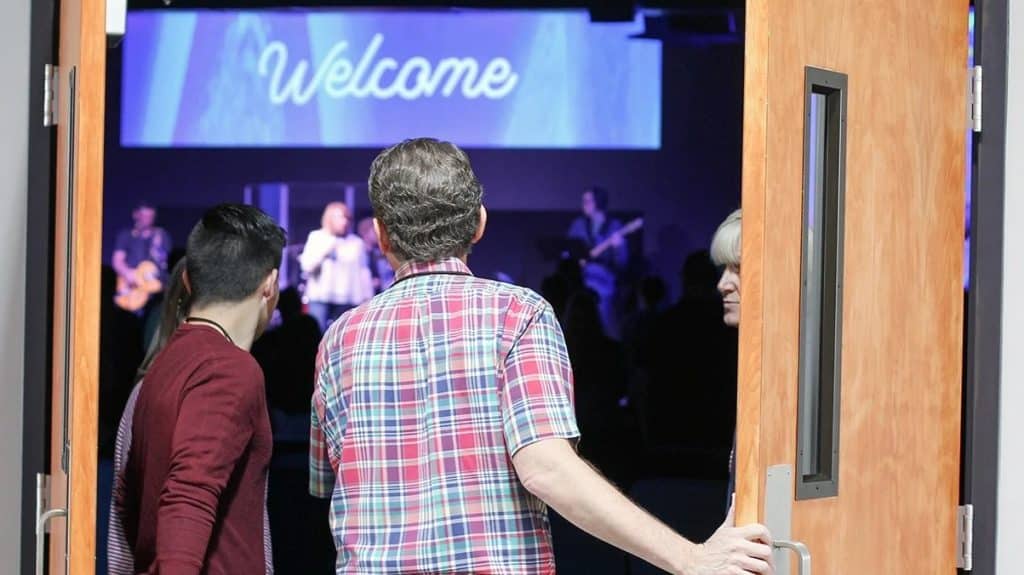
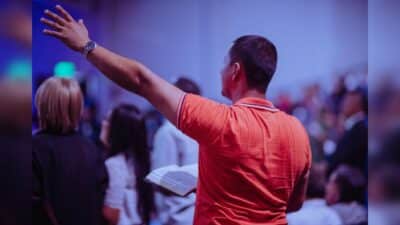
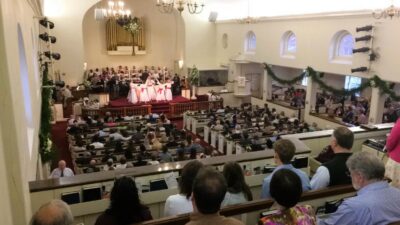
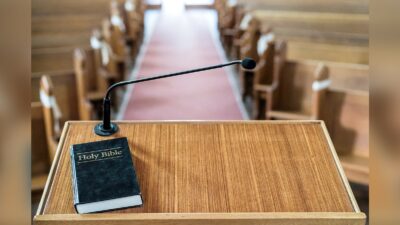


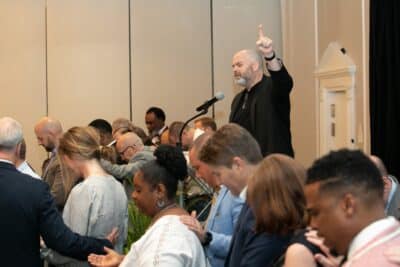
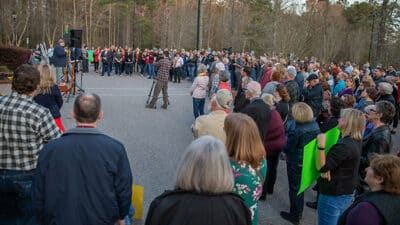

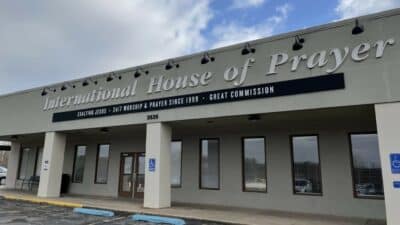






13 Responses
A very interesting article… I’ve been reading “Not in it to win it” by Andy Stanley. It fits very nicely with this research.
Since politics attempts to regulate morality and the Bible is the authority on morality then it makes sense that “politics” would influence the church one attends.
Sara,
Paul tells us to beat our own bodies into submission to be more like Christ. He does not tell us to create laws to use the force of government to do the same to others.
If we want to live in a Christian nation, the place to start is for God’s people to start living like Jesus- caring for the poor, the sick, the underrepresented, the widows, orphans and refugees. And in that Christian nation, their policies regarding the safety net, health care, education and immigration would reflect those values.
While it might make sociological sense for politics to influence the church that an individual church-going citizen attends, in a pluralistic country like the USA there are millions of citizens who do not agree that the Bible is THE authority on morality. The best consensus you could hope for is that the Bible is AN authority on morality for those who choose to follow its teachings. And since American politics is representative of millions of voices who don’t agree that the Bible, or any religious text for that matter, should be the final say on what laws to pass, it is a long-term unwise, repulsive, socially exclusive, and ultimately self-destructive standard for leaders of churches (mosques, temples, etc.) to turn to politics for deciding what to preach, teach, support, and advocate for.
Sara –
Shouldn’t the church influence politics, not vice versa? Politics influencing the church has been the problem that got us here.
This has been self-evident for years. If you’re politically liberal, you’re not going to find much joy in a church that doesn’t welcome gay people as full participants in the church family (i.e. eligible to be elders, teachers, etc.), and if you’re politically conservative, you’re not going to find much joy in a church that has more sermons about social justice than it does sermons on the book of Jeremiah.
There will always be exceptions, of course — I know political conservatives who are fully supportive of gay marriage, for example — but when I see someone online asking which church or denomination they should attend, the first question I ask is where their politics lies.
Mike, you nailed it. Thanks for the clarity…
The split over politics is disheartening, but this statement gave me the most pause.
“Evangelical Christians (81%) were most likely to have shopped for a new church.”
I’ve got no real answers but that seems like something that should give us pause. What is making so many evangelicals look for a new church?
Karl, I think that with Trump something new happened, which is that churches that had previously not publicly taken political positions suddenly became outspokenly political. It’s one thing to know that a majority of the people in the pews next to me have similar political views; it’s another thing to have churches openly entering the political ring and anathematizing those who disagree. And I think that cost of that is that a lot of people have left the church. I think the evangelical church is going to be paying for its public support of Trump for a long time to come.
I agree with you, Kathleen. People also stopped being open to other points of view about anything when they started becoming openly political.
I am reading the book Worship Beyond Nationalism: Practicing the Reign of God. Every Christian should have to read it so we will quit focusing on the politics of our earthly kingdoms and more on the heavenly Kingdom.
When evangelicals married themselves to Trump and when evangelical leaders became high priests of the Trump cult, they endorsed Trump’s lies, immorality, and calls to violence. Endorsing all the lies calls into question the truth of absolutely everything else they claim is true. The upside is that they have exposed themselves for what they are. All of the sanctimonious preaching of evangelicals can be ignored without the least feeling of guilt. It’s all lies.
If a church’s theology is sound and biblical, the politics won’t be an issue.